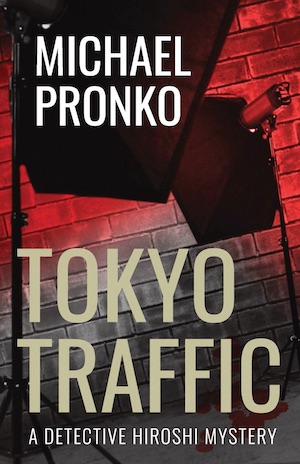
Tokyo is a city like any other, except much much bigger. By some counts it ranks as the world’s largest city, and it’s a place Michael Pronko knows well, as proven by his writing on the subject, which includes his detective Hiroshi mystery books. Tokyo Traffic is third in the series.
Detective Hiroshi is an accidental homicide investigator. Introduced in the two earlier novels, The Last Train and The Moving Blade, Hiroshi is an economics major who studied at Harvard before drifting back to Tokyo and away from his American wife. Obsessed with numbers and fluent in English, Hiroshi finds himself working at the Tokyo metropolitan police, where he thinks not enough people understand numbers or English. Hiroshi spends long nights working, waiting up for phone calls from overseas and poring over spreadsheets of figures. It’s something that continues to put strain on his relationships.
Pronko cuts right to Tokyo’s heart, examining an underworld that few Japanese even would be aware of, or would want to know about. In Tokyo Traffic, he examines the pornography industry, which skirts the boundaries of legality at the best of times and has ties to underworld gangs and human trafficking.
Sukanya is a young Thai woman, little more than a girl really, who was lured to Tokyo with the promise of money and a passport to America. From the rural north of Thailand, she struggled after moving to Bangkok and became easy prey for the human traffickers that sell young women across borders to fulfill male fantasies. Sukanya ends up at Jack and Jill Studios, a porn studio in a warehouse somewhere in Tokyo, with links that run from government officials with a taste for behind the scenes photography to cryptocurrency exchanges and brutal gangsters.
When three people are found brutally murdered at the studio, Hiroshi is the man who sets out to locate the killers, first by tracing the flow of cryptocurrency and then by delving deep into the world in which the criminals operate – a world of high rise apartments and seedy dive bars. But Hiroshi’s not the only one out to find the killers. There’s also Kenta, a mid-level gangster who needs to find out what happened before his bosses realise a computer filled with all of the studio’s secrets has gone missing, along with two of the girls.
One of those missing girls in Sukanya. Completely lost in Tokyo, and terrified of the police as much as she is of the gangsters, she finds herself drawn to Chiho, another outcast on the fringes of Japanese society, living in an internet cafe (the cheapest place to live in Tokyo) and running from her own shady past.
Told in almost-regular alternating chapters between Sukanya, Hiroshi and the gangsters, Tokyo Traffic comes together gradually, building to a slow climax. The who, how and why of the brutal murders that occur in the book’s first pages aren’t explained until very near the last, and the tension remains constant throughout. Alongside that tension there are slowly building layers of backstory, which are fed in slowly and give an insight into the history of all of the characters, good and bad.
I read and reviewed the first two in this series, and am happy to say that Tokyo Traffic is as good as the first two, if not better. It makes for uncomfortable reading at many points, but it’s a necessary discomfort. Tokyo Traffic exposes what is wrong with the new global economy, and does it in the form of a tense, compelling mystery.
For more crime fiction set in Japan, click here.
Raked Gravel Press
Print/Kindle
£5.67
CFL Rating: 5 Stars










